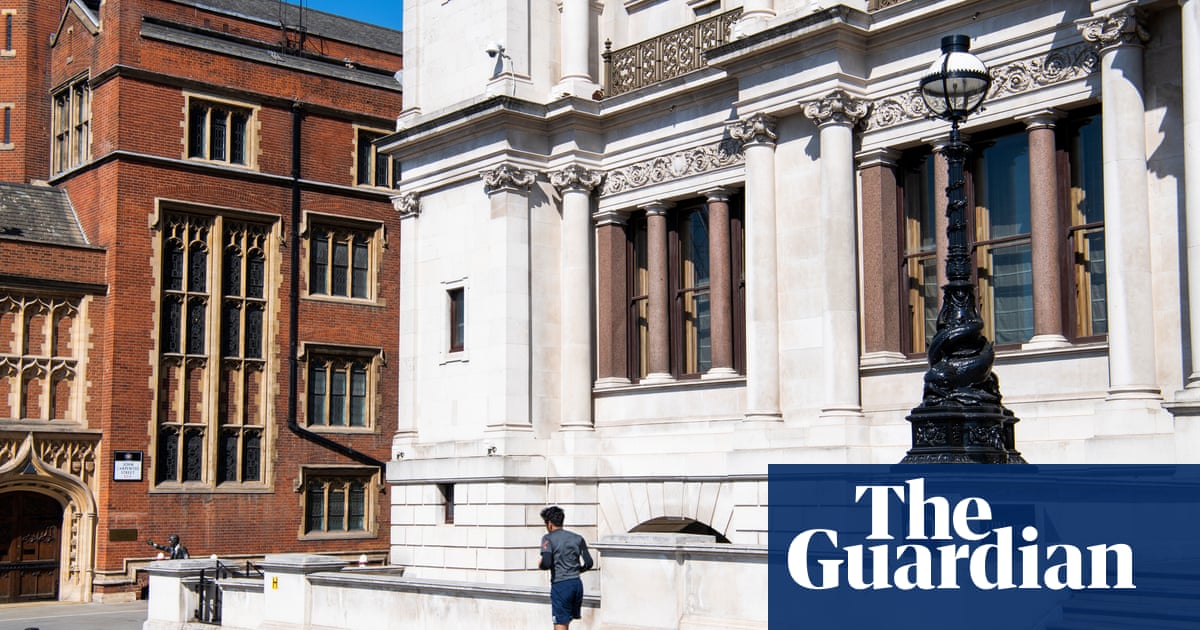
Five climate protesters armed with hammers and chisels smashed a glass door at the European headquarters of the American investment bank JP Morgan in London, a court heard.
The Extinction Rebellion activists targeted the bank in the City of London, smashing a large glazed panel revolving door and causing many thousands of pounds-worth of damage, a jury was told on Tuesday.
Brett Weaver, prosecuting at their trial at Inner London crown court, said the five women made their way to JP Morgan early on 1 September 2021.
“One of the security staff at the premises saw them approaching and recognised that some form of protest action was about to take place,” said Weaver.
“The defendants climbed over the temporary railings that were positioned in front of the entrance area. They began to strike at the glass doors of the building using hammers, chisels and other implements.
“As they did so, cracks began to appear in the glass and one of the hinged doors shattered effectively.”
Amy Pritchard, 38, Stephanie Aylett, 29, Adelheid Russenberger, 32, Rosemary Webster, 66, and Pamela Bellinger, 66, deny causing criminal damage.
Weaver said once the glass was damaged the defendants and their companions moved back over the temporary railings and on to the street.
Police called to the scene found a group of protesters seated on the ground in a circle in front of the building.
“In front of the group, on the ground, were a number of implements, such as hammers and chisels,” said Weaver.
Weaver said the protesters caused damage to the revolving door, one of the hinged doors, and the larger glass panel that surrounded the hinged door.
He said Aylett was wearing clothing with a number of coloured signs attached, most obviously a pink sign on her back that said: “Deeds not words”, Weaver said: “Their actions, coupled with the fact that they also had implements intended to be used to damage the glass, demonstrate that each of them was part of a coordinated plan to cause both disruption and damage to that building.
“As a result of their actions, the damage caused was significant. The glass doors had to be replaced. More significantly, the large, glazed panel had to be replaced entirely.”
Weaver said the point of their actions was to “disrupt the lawful business of JP Morgan and draw attention to their cause”.
“The actions of these defendants arose in the context of a protest on behalf of Extinction Rebellion,” he said
“None of them are anticipated to dispute that they each caused damage to the windows or doors or panel. The issue will be whether any or all of them had any lawful defence to causing such damage.”
The prosecutor said the case was not about the rights and wrongs of the government’s climate policies or the activities of financial institutions in respect of fossil fuels.
“Nor is it about whether the motives behind the actions of Extinction Rebellion are right or wrong,” he said.
Addressing the jury at the start of the trial, Judge Silas Reid asked them to put aside sympathy or prejudice.
“You may have views about those actions or organisations, you may have views about climate change,” said Reid. “This is not a trial about climate change. It is a trial about criminal damage. It is nothing more than that, and nothing less.”
Pritchard, of Walthamstow, Aylett, of St Albans, Hertfordshire, Bellinger, of Leicester, Russenberger, of Richmond-upon-Thames, south-west London and Webster, of Dorchester, Dorset, all deny criminal damage.
The trial continues.












